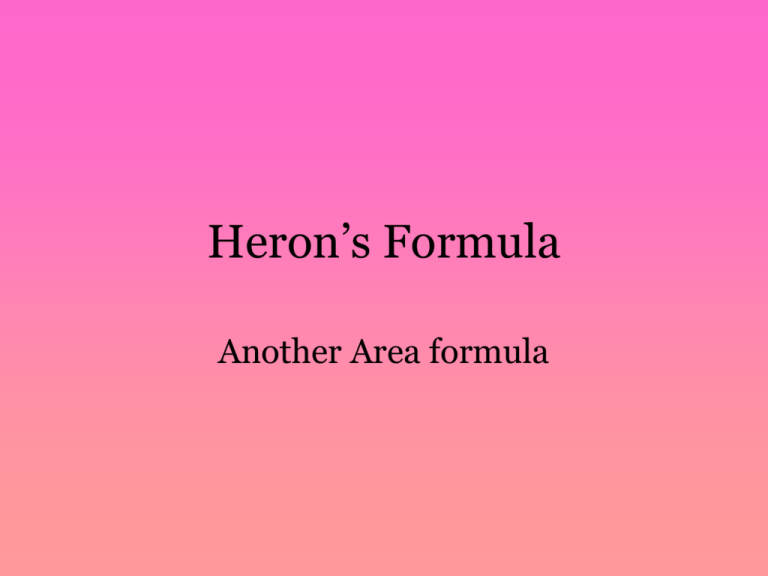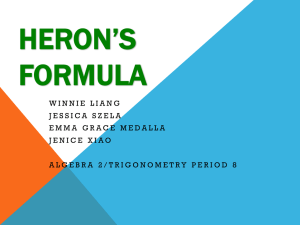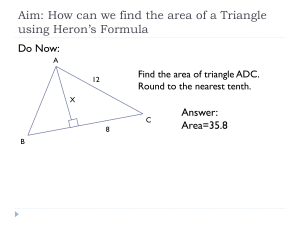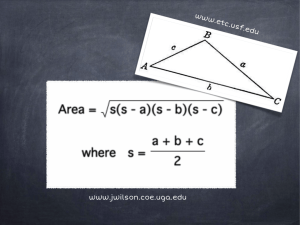Heron's Formula
advertisement

Heron’s Formula Another Area formula Who is Heron? • Heron of Alexandria (also called Hero) was a Geometer of Egypt. There is some confusion as to the date he lived, but generally it appears that he was born in approximately 10 AD and died in 75 AD. (Believe it or not, his name was pretty common, so determining lifetime of the Heron that we are thinking of is tough) • He was most likely a teacher at the Museum in Alexandria. Notes attributed to him appear to be lecture notes on Physics, Mathematics, Pneumatics and mechanics. • He proved Heron's Formula in Book 1 of the Metrica, a work that outlines methods of measurement. Interesting to note Although Heron has his name on the formula, our book (and other resources) suggest that Archimedes may have actually developed Heron’s Formula, not Heron. Just goes to show you that just because a name is on it doesn’t necessarily mean that person discovered it. For instance, it is known that the Chinese had known about Pascal’s Triangle for 300 years before Pascal’s time. (see pg 494 in our book) What is Heron’s Formula? We’ve been using the formula 1 A ac sin 2 to find the area of non right triangles. This formula is valuable because it can be used with SSS triangles. What does that mean? We don’t need an angle!! Where does it come from? The next slide takes through the step by step of the derivation of Heron’s formula. You do not need to memorize it; just understand it. SSS Triangles (need to get rid of angles) 1 A bc sin A 2 1 2 2 A b c sin2 A 4 2 1 2 2 A b c (1 cos2 A) 4 2 1 2 2 2 A b c (1 cos A)(1 cos A) 4 b2 c 2 a 2 cos A 2bc 2 2 2 2 2 2 1 b c a b c a 2 2 2 A b c 1 1 4 2bc 2bc 2 2 2 2 2 2 1 b c a b c a 2 A bc bc 4 2 2 1 A 2bc (b2 c 2 a 2 ) 2bc (b2 c 2 a 2 ) 16 2 1 2 A a b2 2bc c 2 b2 2bc c 2 a 2 16 2 1 2 A a (b c)2 (b c)2 a 2 16 2 1 A (a b c)(a b c) (b c a)(b c a) 16 2 1 s (a b c) 2 2s a b c 1 A 2s(2s 2c)(2s 2a)(2s 2b) 16 2 A2 s(s c)(s a)(s b) A s(s a)(s b)(s c) Examples 1. Given ΔABC with a = 3, b = 4 and c = 5, find the area using Heron’s Formula. 2. If ΔABC has sides 3, 4 and 5, what kind of triangle is it? Find the area using another formula for area. 3. Given ΔABC with a = 4, b = 4 and c = 6, find the area using Heron’s formula . 4. Use your calculator to determine the area of the triangle in problem 3. Make sure that your answer from 3 is the same as the answer you get with the calculator. Resources http://www-groups.dcs.st-and.ac.uk/~history/Mathematicians/Heron.html Sobel, Max, Lerner, Norbert, (1995) Precalculus mathematics 5th Edition, Englewood Cliffs, NJ, Prentice Hall, Inc.





